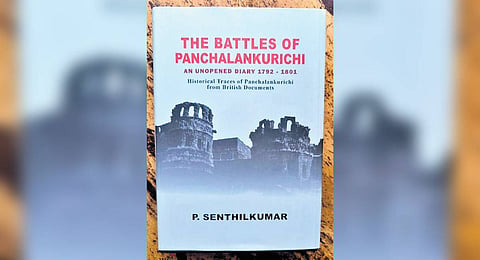

CHENNAI: Around 223 years after he was hanged for carrying out a valiant war against the Britishers, an evidence-rich history of the Panchalarnkurichi wars led by Veerapandiya Kattabomman and his brothers has been documented using the British's own records.
The book titled, "The Battles of Panchalankurichi - An Unopened Diary 1792-1801 - Historical Traces from British Documents," written by P Senthilkumar was recently released by Governor RN Ravi. It contains several previously unpublished facts referred to as circumstantial evidence for the wars fought by Kattabomman and his brothers against the British.
Panchalankurichi wars were crucial conflicts between the Poligars and the Britishers that took place between the end of the 18th and the beginning of the 19th century.
Senthilkumar told TNIE that he aimed to separate the historical facts relating to Kattabomman from the fable and folklore that existed for centuries about the wars. To ascertain facts, Senthilkumar spent months in the Tamil Nadu Archives which was originally called the Madras Records Office by the Britishers. He also contacted the Buckingham Palace Museum in England and the Royal Collection Trust and the Museum authorities have confirmed that the sword of Kattabomman is preserved and displayed there till now.
"So far 1857 Sepoy Mutiny is regarded as the first war against the Britishers. But the Panchalankurichi wars wherein hundreds of people were killed is yet to be given that recognition at the national level," Senthilkumar said.
Senthilkumar said he found 1,353 pages of records about Kattambooman in the Tamil Nadu Government Archives. The British recorded each day's events by creating sections under 11 topics -- military, revenue, political and secret consultations, military and secret despatches to England, etc. They include political negotiations with Kattabomman during 1798 and 1799, Palayam War I at Panchalankurichi, Kattabomman's execution, information about Kattabomman's brothers Oomaithurai and Sivathaiya during 1801, Palayam War II led by Oomaithurai and the demolition of Palayamkottai jail.
"If you study the battles that took place as part of the freedom movement of India from Kashmir to Kanyakumari, the British suffered the biggest loss of life only in the 110-day battlefield at Panchalankurichi. More than 800 British Army soldiers died in the battle including 49 high-ranking officers. There is still evidence in the form of mausoleums of Britishers near Panchalankurichi," the author said.
It was only after the agreement between the Nawab of Arcot and the East India Company on July 12, 1792, that the district collectors were employed and the work of tax collection started. They declared: "Your entire country has come under our control, we are the government of this country, you have to respect all the orders of our government, no poligar should keep an army, no tax should be collected by them.Kattabomman refused to accept foreign domination with the help of his countrymen and fought against the British.
Senthilkumar is also planning to bring out another volume on Kattabomman's life which would answer many more questions as to what happened to the body of Kattabomman after hanging.
Asked about the claims doing the rounds in the 1960s that Kattabomman was not a freedom fighter and the books in this regard, Senthilkumar dismissed them as political propaganda of those who have a parochial attitude. Around 5,000 soldiers belonging to numerous castes have lost their lives in the Panchalakurichi wars.
"For so many years, these documents have not seen the light of the day. So far, we have come to know about Kattabomman only through folk songs, folk tales etc. Only through the correspondence of the British officers with their higher-ups that we learn Kattabomman was indeed an important personality. Kattabomman was also the first to insult the British flag in the country. He refused to accept the Zamindari system insisted on by the Britishers," Senthilkumar said.